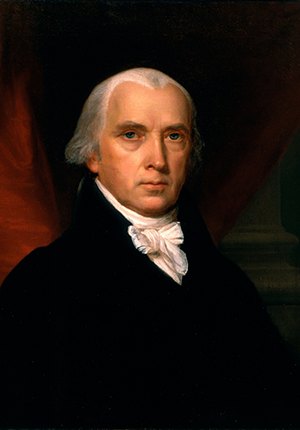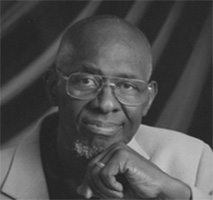Historic Document
Memorial and Remonstrance Against Religious Assessments
James Madison | 1785

White House Historical Association (White House Collection)
Summary
The Memorial is a petition addressed to the General Assembly of Virginia that remonstrates on fifteen counts against a bill before it establishes funding for teachers of the Christian religion. Each of these points is set forth in one paragraph in the form of a reflection on one aspect of the right relation between religion and politics. Madison clearly intended to make the argumentation as complete, as principled, as fundamental, and yet as concise as possible. This petition is presented in the form of a remonstrance, that is, a protest but it is also a memorial, a declaration of reasons.
Selected by

William B. Allen
Emeritus Dean of James Madison College and Emeritus Professor of Political Science at Michigan State University

Jonathan Gienapp
Associate Professor of History at Stanford University
Document Excerpt
To The Honorable the General Assembly of the Commonwealth of Virginia
A Memorial and Remonstrance
We the subscribers, citizens of the said Commonwealth, having taken into serious consideration, a Bill printed by order of the last Session of General Assembly, entitled “A Bill establishing provisions for Teachers of the Christian Religion,” and conceiving that the same if finally armed with the sanctions of a law, will be a dangerous abuse of power, are bound as faithful members of a free State to remonstrate against it, and to declare the reasons by which we are determined. We remonstrate against the said Bill. …
Whereas the general diffusion of Christian knowledge hath a natural tendency to correct the morals of men, restrain their vices, and preserve the peace of society, which cannot be effected without a competent provision for learned teachers, who may be thereby enabled to devote their time and attention to the duty of instructing such citizens as from their circumstances and want of education cannot otherwise attain such knowledge; and it is judged such provision may be made by the Legislature, without counteracting the liberal principle heretofore adopted and intended to be preserved, by abolishing all distinctions of preeminence amongst the different societies or communities of Christians. …
Because we hold it for a fundamental and undeniable truth, “that Religion or the duty which we owe to our Creator and the manner of discharging it, can be directed only by reason and conviction, not by force or violence.” The religion then of every man must be left to the conviction and conscience of every man; and it is the right of every man to exercise it as these may dictate. This right is in its nature an unalienable right. It is unalienable, because the opinions of men, depending only on the evidence contemplated by their own minds cannot follow the dictates of other men: It is unalienable also, because what is here a right towards men, is a duty towards the Creator. It is the duty of every man to render to the Creator such homage and such only as he believes to be acceptable to him. This duty is precedent, both in order of time and in degree of obligation to the claims of Civil Society. Before any man can be considered as a member of Civil Society, he must be considered as a subject of the Governor of the Universe; And if a member of Civil Society, who enters into any subordinate Association, must always do it with a reservation of his duty to the General Authority; much more must every man who becomes a member of any particular Civil Society, do it with a saving of his allegiance to the Universal Sovereign. We maintain therefore that in matters of Religion, no man’s right is abridged by the institution of Civil Society and that Religion is wholly exempt from its cognizance.
Well aware that the opinions and belief of men depend not on their own will, but follow involuntarily the evidence proposed to their minds...
As 1. a member of Civil Society 2. who enters into any subordinate Association 3. must always do it 4. with a reservation of his duty 5. to the General Authority….Much more so must 1. every man 2. who becomes a member of any particular Civil Society 3. do it 4. with a saving of his allegiance 5. to the Universal Sovereign. …
Because if Religion be exempt from the authority of the Society at large, still less can it be subject to that of the Legislative Body. The latter are but the creatures and vicegerents of the former. Their jurisdiction is both derivative and limited: it is limited with regard to the co-ordinate departments, more necessarily is it limited with regard to the constituents. The preservation of a free Government requires not merely, that the metes and bounds which separate each department of power be invariably maintained; but more especially that neither of them be suffered to overleap the great Barrier which defends the rights of the people. The Rulers who are guilty of such an encroachment, exceed the commission from which they derive their authority, and are Tyrants. The People who submit to it are governed by laws made neither by themselves nor by an authority derived from them, and are slaves. …
Because it is proper to take alarm at the first experiment on our liberties. We hold this prudent jealousy to be the first duty of Citizens, and one of the noblest characteristics of the late Revolution. The free men of America did not wait till usurped power had strengthened itself by exercise, and entangled the question in precedents, they saw all the consequences in the principle, and they avoided the consequences by denying the principle. We revere this lesson too much soon to forget it. …
Because the Bill violates that equality which ought to be the basis of every law, and which is more indispensible, in proportion as the validity or expediency of any law is more liable to be impeached. If “all men are by nature equally free and independent,” all men are to be considered as entering into Society on equal conditions; as relinquishing no more, and therefore retaining no less, one than another, of their natural rights. Above all are they to be considered as retaining an “equal title to the free exercise of Religion according to the dictates of Conscience.” Whilst we assert for ourselves a freedom to embrace, to profess and to observe the Religion which we believe to be of divine origin, we cannot deny an equal freedom to those whose minds have not yet yielded to the evidence which has convinced us. If this freedom be abused, it is an offence against God, not against man: To God, therefore, not to man, must an account of it be rendered. As the Bill violates equality by subjecting some to peculiar burdens, so it violates the same principle, by granting to others peculiar exemptions. …
Because the Bill implies either that the Civil Magistrate is a competent Judge of Religious Truth; or that he may employ Religion as an engine of Civil policy. The first is an arrogant pretension falsified by the contradictory opinions of Rulers in all ages, and throughout the world: the second an unhallowed perversion of the means of salvation. …
Because the establishment proposed by the Bill is not requisite for the support of the Christian Religion. To say that it is, is a contradiction to the Christian Religion itself, for every page of it disavows a dependence on the powers of this world: it is a contradiction to fact; for it is known that this Religion both existed and flourished, not only without the support of human laws, but in spite of every opposition from them, and not only during the period of miraculous aid, but long after it had been left to its own evidence and the ordinary care of Providence. Nay, it is a contradiction in terms; for a Religion not invented by human policy, must have pre-existed and been supported before it was established by human policy. …
Because experience witnesseth that ecclesiastical establishments, instead of maintaining the purity and efficacy of Religion, have had a contrary operation. During almost fifteen centuries has the legal establishment of Christianity been on trial. What have been its fruits? More or less in all places, pride and indolence in the Clergy, ignorance and servility in the laity, in both, superstition, bigotry and persecution. Enquire of the Teachers of Christianity for the ages in which it appeared in its greatest lustre; those of every sect, point to the ages prior to its incorporation with Civil policy. Propose a restoration of this primitive State in which its Teachers depended on the voluntary rewards of their flocks, many of them predict its downfall. On which Side ought their testimony to have greatest weight, when for or when against their interest?
Because the establishment in question is not necessary for the support of Civil Government. If it be urged as necessary for the support of Civil Government only as it is a means of supporting Religion, and it be not necessary for the latter purpose, it cannot be necessary for the former. If Religion be not within the cognizance of Civil Government how can its legal establishment be necessary to Civil Government? What influence in fact have ecclesiastical establishments had on Civil Society? In some instances they have been seen to erect a spiritual tyranny on the ruins of the Civil authority; in many instances they have been seen upholding the thrones of political tyranny; in no instance have they been seen the guardians of the liberties of the people. Rulers who wished to subvert the public liberty, may have found an established Clergy convenient auxiliaries. A just Government instituted to secure & perpetuate it needs them not. Such a Government will be best supported by protecting every Citizen in the enjoyment of his Religion with the same equal hand which protects his person and his property; by neither invading the equal rights of any Sect, nor suffering any Sect to invade those of another. …
Because the proposed establishment is a departure from that generous policy, which, offering an Asylum to the persecuted and oppressed of every Nation and Religion, promised a lustre to our country, and an accession to the number of its citizens. What a melancholy mark is the Bill of sudden degeneracy? Instead of holding forth an Asylum to the persecuted, it is itself a signal of persecution. It degrades from the equal rank of Citizens all those whose opinions in Religion do not bend to those of the Legislative authority. …
Because it will destroy that moderation and harmony which the forbearance of our laws to intermeddle with Religion has produced among its several sects. Torrents of blood have been spilt in the old world, by vain attempts of the secular arm, to extinguish Religious discord, by proscribing all difference in Religious opinion. Time has at length revealed the true remedy. Every relaxation of narrow and rigorous policy, wherever it has been tried, has been found to assuage the disease. The American Theatre has exhibited proofs that equal and compleat liberty, if it does not wholly eradicate it, sufficiently destroys its malignant influence on the health and prosperity of the State. If with the salutary effects of this system under our own eyes, we begin to contract the bounds of Religious freedom, we know no name that will too severely reproach our folly. At least let warning be taken at the first fruits of the threatened innovation. The very appearance of the Bill has transformed “that Christian forbearance, love and charity,” which of late mutually prevailed, into animosities and jealousies, which may not soon be appeased. What mischiefs may not be dreaded, should this enemy to the public quiet be armed with the force of a law?
Because the policy of the Bill is adverse to the diffusion of the light of Christianity. The first wish of those who enjoy this precious gift ought to be that it may be imparted to the whole race of mankind. Compare the number of those who have as yet received it with the number still remaining under the dominion of false Religions; and how small is the former! Does the policy of the Bill tend to lessen the disproportion? No; it at once discourages those who are strangers to the light of revelation from coming into the Region of it; and countenances by example the nations who continue in darkness, in shutting out those who might convey it to them. Instead of Levelling as far as possible, every obstacle to the victorious progress of Truth, the Bill with an ignoble and unchristian timidity would circumscribe it with a wall of defence against the encroachments of error…that truth is great and will prevail if left to herself: that she is the proper and sufficient antagonist to error and has nothing to fear from the conflict unless by human interposition disarmed of her natural weapons, free argument and debate. …
Because attempts to enforce by legal sanctions, acts obnoxious to so great a proportion of Citizens, tend to enervate the laws in general, and to slacken the bands of Society. If it be difficult to execute any law which is not generally deemed necessary or salutary, what must be the case, where it is deemed invalid and dangerous? And what may be the effect of so striking an example of impotency in the Government, on its general authority?
Because a measure of such singular magnitude and delicacy ought not to be imposed, without the clearest evidence that it is called for by a majority of citizens, and no satisfactory method is yet proposed by which the voice of the majority in this case may be determined, or its influence secured. “The people of the respective counties are indeed requested to signify their opinion respecting the adoption of the Bill to the next Session of Assembly.” But the representation must be made equal, before the voice either of the Representatives or of the Counties will be that of the people. Our hope is that neither of the former will, after due consideration, espouse the dangerous principle of the Bill. Should the event disappoint us, it will still leave us in full confidence, that a fair appeal to the latter will reverse the sentence against our liberties. …
Because finally, “the equal right of every citizen to the free exercise of his Religion according to the dictates of conscience” is held by the same tenure with all our other rights. If we recur to its origin, it is equally the gift of nature; if we weigh its importance, it cannot be less dear to us; if we consult the “Declaration of those rights which pertain to the good people of Virginia, as the basis and foundation of Government,” it is enumerated with equal solemnity, or rather studied emphasis.
Originally Excerpted by Eva Brann in Madison’s “Memorial and Remonstrance: A Jewel of Republican Rhetoric.” http://www.theimaginativeconservative.org/2013/06/madisons-memorial-remonstrance-republican-rhetoric.html




